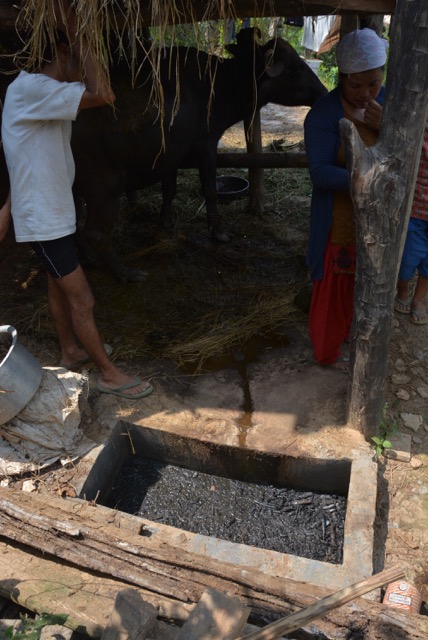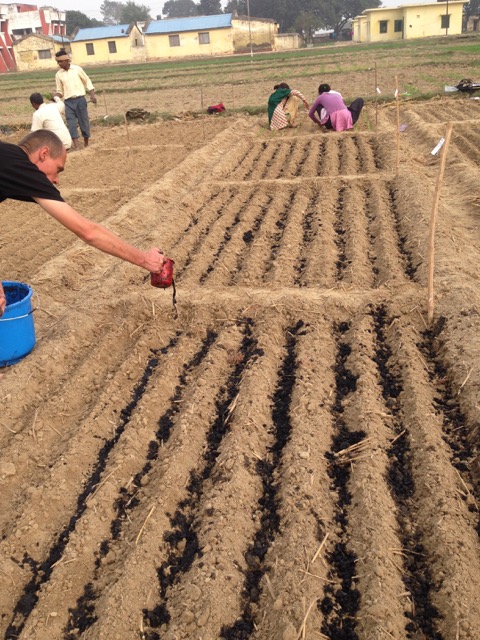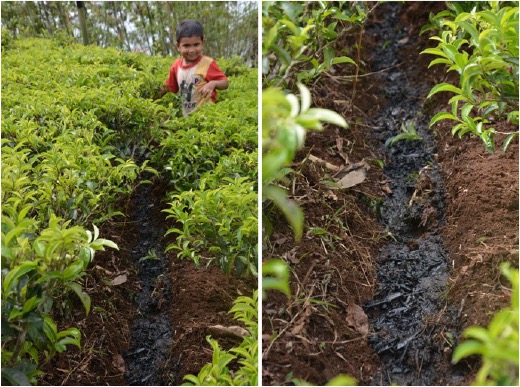Biochar based fertilization
21 FIELD TRIALS COVERING 13 CROP SPECIES IN NEPAL
Biochar produced in cost-efficient flame curtain kilns (Kon-Tiki) was nutrient enriched either with cow urine or with dissolved mineral (NPK) fertilizer to produce biochar-based fertilizers containing between 60-100 kg N, 5-60 kg P2O5 and 60-100 kg K2O, respectively, per ton of biochar. In 21 field trials nutrient-enriched biochars were applied at low dosage rates of 0.5-2 t ha-1 into the root zone of 13 different crops. Treatments combining biochar, compost and organic or chemical fertilizer were evaluated; control treatments contained the same amounts of nutrients but without biochar. All nutrient-enriched biochar substrates improved yields compared to their respective no-biochar controls.

Figure 1: Cattle urine enrichment of biochar directly at the cow shed in Bandipur.
Biochar enriched with dissolved NPK produced on average 20% ± 5.1% (N=4 trials) higher yields than standard NPK fertilization without biochar. Cow urine-enriched biochar blended with compost resulted on average in 123% ± 76.7% (N=13 trials) higher yields compared to the organic farmer practice with cow urine-blended compost and outcompeted NPK-enriched biochar (same nutrient dose) by 103% ± 12.4% (N=4 trials), respectively. Thus, the results of 21 field trials robustly revealed that low-dosage root zone application of organic biochar-based fertilizers caused substantial yield increases in rather fertile silt loam soils compared to traditional organic fertilization and to mineral NPK- or NPK-biochar fertilization. This can be explained by the nutrient carrier effect of biochar, causing a slow nutrient release behavior, more balanced nutrient fluxes, and reduced nutrient losses, especially when liquid organic nutrients are used for the biochar enrichment. The results open up new pathways for optimizing organic farming and improving on-farm nutrient cycling.

Figure 2: Application of organic biochar based fertilizers for an onion plantation in the Terai.
The results and discussion of this exemplary project were published 2017 in the renown scientific journal Land Degradation and Development. The publication captured the attention of biochar scientists around the world and inspired countless field trials in many regions and countries. Eventually, Nepal became the world's first country to subsidize farmers to implement biochar based recovery of liquid manure and on-farm production of advanced organic biochar based fertilizers.
The paper concluded:
It was demonstrated with a large number of field trials that organic and mineral nutrient enrichment of biochar and its subsequent low dosage application (0.5 and 2 t ha-1 ) to the root zone of various crops considerably increased crop yields compared to the same fertilization type and amount without biochar. Organic nutrient enrichment of biochar was consistently more effective than mineral nutrient enrichment opening up new perspectives and economic opportunities for the future of organic farming.

Figure 3: Root zone application of urine-biochar in a tea plantation in Ilam.
The yields obtained in the cow urine-biochar treatments were consistently at the higher end or exceeding those of optimized conventional farming (Tab. S1), demonstrating that organic biochar-based fertilization methods are able to optimize plant nutrition and hence crop productivity. The methods described and demonstrated here were effective on relatively fertile soils in “productive” climates and may thus have the potential to develop into a new, long-term approach for sustainable, CO2-negative (i.e. C-sequestering) and nutrient efficient agriculture, expanding on the more traditional perspective that biochar is only a solution for highly degraded soils in suboptimal agronomic systems. High quality, organic biochar-based fertilizers can easily be produced on-farm, recycling organic (waste) nutrients and waste biomass carbon, reducing the ecological footprint of agriculture and improving on-farm economics and in particular small-scale farmer income, independence and resilience to climate impacts.
Please find the complete publication here as open access download.

